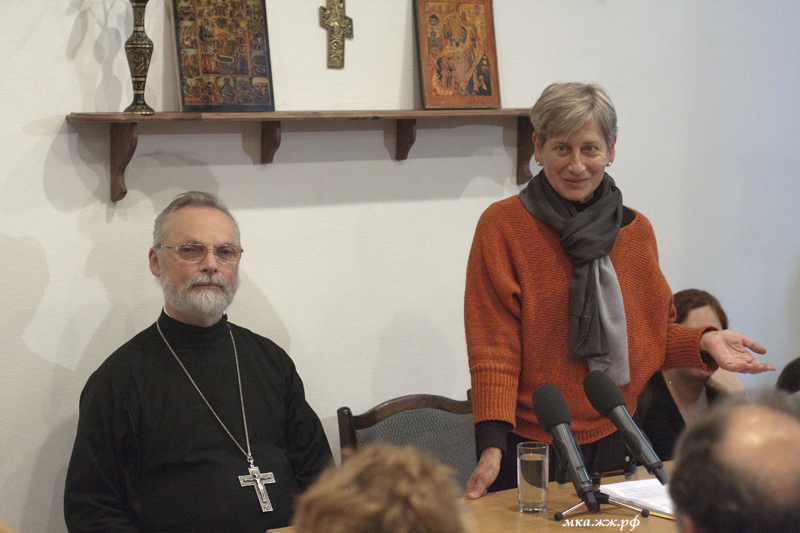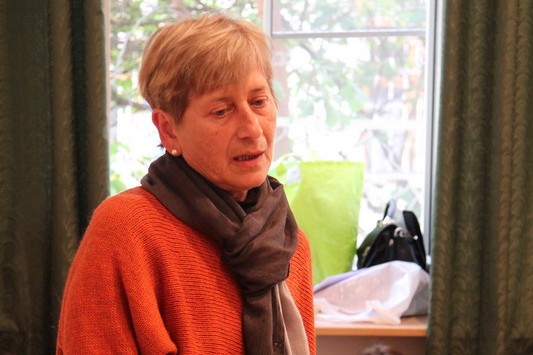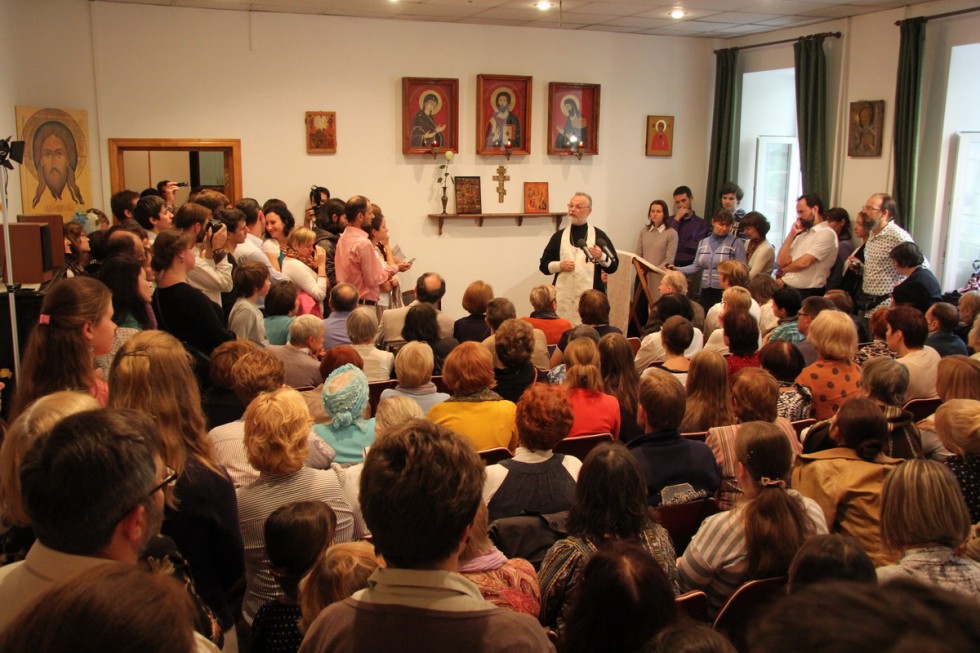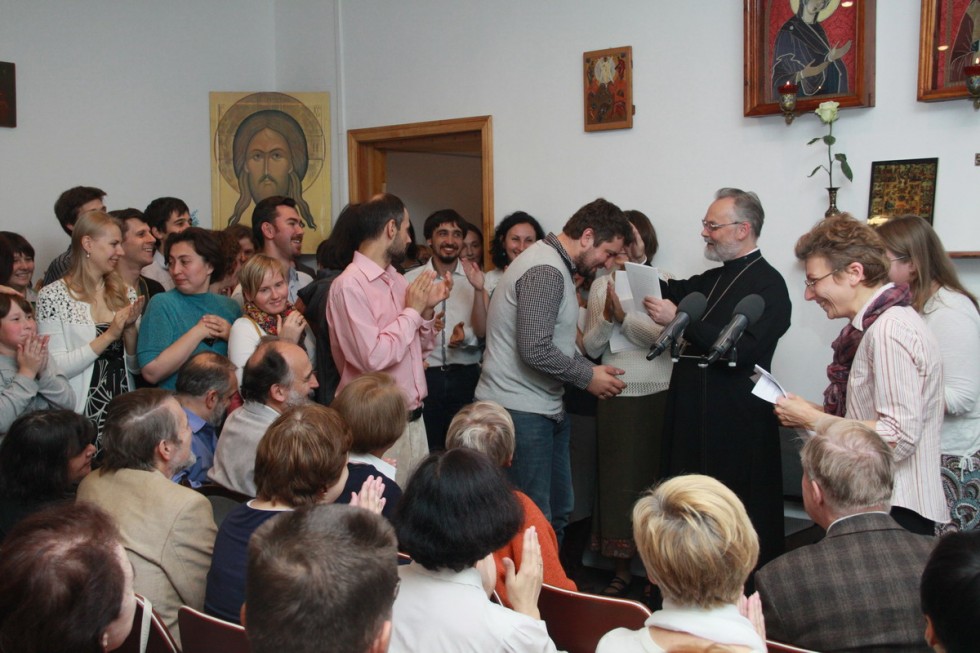Olga Sedakova Delivers a Lecture on ‘Poetry and Anthropology’ at St Philaret’s Institute
Olga Sedakova Delivers a Lecture on ‘Poetry and Anthropology’ at St Philaret’s Institute
We’re publishing an overview of the commencement lecture ‘Poetry and Anthropology’ delivered by Olga Sedakova at the beginning of this academic year at St Philaret’s Institute.

Fr. Georgy Kochetkov, Rector of St Philaret’s Institute, and Olga Sedakova, poet, translator, member of the SFI Board of Trustees
‘In the 20th century we discovered that historical movements and decisions depend on the concept of man’ said Olga Sedakova. She traced the evolution of the concept of man from the humanism of the Enlightenment to contemporary post-secular anthropology.
Failure of the ‘Secular Project’
The Enlightenment attributes highly regarded qualities to mankind, including a natural inclination towards the good (if unobstructed). It takes seriously neither the idea of the fall nor the creation of man in the image of God. The Enlightenment believes that man can find himself using the universal ethics and reason, which eliminates prejudice and vices without encountering any obstacles.
It became evident in the 19th and especially in the 20th century that obstacles do exist. Studies of archaic cultures discovered mythological consciousness, which operates no rational concepts but images and metaphors. Man faced a mystery within himself. It became apparent that darkness could be attractive and that mankind was drawn by power irrespective of whether it was good or evil. Beyond-consciousness, the will to die and propensity to violence turned out to be inherent human qualities. Brought into the light, instead of ‘boring’ humanism with its concepts of ‘good’ and ‘bad’, this myth offered mysterious darkness with its captivating life force. Traditionalist and fascist movements inEuropewere associated with mythological consciousness and excitement about it, with the triumph of the dark Dionysian principle.
Proof of the Fall
In response to the humanistic rise of man, anthropology of contempt for human person emerged and was tested by the totalitarian regimes of the 20th and 21st centuries. In addition to the Nazi and Communist regimes, contemporary Christian thinkers have identified the third regime of this type in human history, namely non-ideological totalitarianism with ‘effectiveness’ as its main attribute and which subdues man in the same way as class and national ideas do.
Hannah Arendt saw the ‘terroristic hypothesis about person’ as an anthropological prerequisite of totalitarianism. According to it, man is an infinitely yielding being composed of basic longings, mainly fear and greed. ‘The Enlightenment does not see man in view of the original sin, but the secret police knows no other way of seeing,’ said Olga Sedakova.
Auschwitzand the Gulag experimentally proved that humans are profoundly damaged and invalidated the message of the Enlightenment about all people being naturally good. However, those directly involved owed the feeling of their personal innocence to an Enlightenment-induced habit of explaining and justifying mankind by external circumstances.
Is it Possible to Believe in Mankind?
If mankind is really both sinful and innocent, and always justifiable by external circumstances, contemporary ‘therapeutic anthropology’ is the only working hypothesis. Instead of an artist, a thinker and an image of God, it sees the person as merely a ‘patient’, someone who is bad but only due to harsh conditions. Such a ‘cynically kind attitude to person’ is the ‘hangover’ that follows the collapse of the Enlightenment anthropologyss, thinks Olga Sedakova.
People like Hannah Arendt and Dietrich Bonhöffer,who witnessed historical events of the 20th century, started looking for ways of justifying mankind. Is a new Christian humanism possible? Is it possible not to lose faith in mankind when faced with the law of sin described by Apostle Paul: “For I don’t do the good I want to do, but instead do the evil that I don’t want to do” (Romans 7:19)? Can we see man as someone who, according to the Christian revelation, is capable of receiving God?
Olga Sedakova maintains that poetry, which has not been considered in the context of anthropology, provides grounds for anthropodicy, raises the issue of the person’s interior makeup and says something about the person. Man is, first and foremost, his own work but not in the usual sense of work vs. gift. Here, it is a ‘gift of work’ and ‘work of gift’. It is as though a human being is always not quite yet a person. It is not a given, it is potential,’ said Olga Sedakova.
Translated by Alina Patrakova, Ekaterina Zvyagintseva
Olga Sedakova, poet, writer, translator, SFI Board of Trustees member. Studied Philology under the aegis of Sergei Averintsev and a number of other prominent philologists. Scholarly interests include the history of Russian and Old Slavonic languages, traditional culture and mythology, liturgical poetry, and the general hermeneutics of the poetic text. Translated European poetry (English folk verse, T. S. Eliot, Ezra Pound, John Donne, Rainer Maria Rilke, Paul Celan, St. Francis of Assisi, Dante, Paul Claudel), drama, philosophy, theology (Paul Tillich et al.). Participates in festivals and conferences, teaches and gives lectures at universities all over the world.

Olga Sedakova

Sermon on a Gospel reading (Matthew 13:44-57) by Fr. Georgy Kochetkov

His Reverence Rector congratulates new students on admission to the Institute
